Topic: School finance
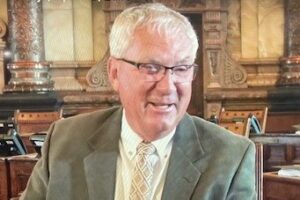
Interview of Fred Kerr, April 13, 2018
Interviewed by H. Edward (Ed) Flentje
Fred Kerr reflects on his 15 years in the Kansas Senate representing the 33rd Senate district. He recalls Senate leaders and fellow Senators who helped him as a freshman and whose influence guided him throughout his career. Fred talks about the process involved in securing a leadership position in the Senate and the dynamics of leadership races. He observes how relationships between competitors for leadership offices affected Senators differently and how they worked together in subsequent legislative sessions. He also reflects on how decisions were made regarding tax policy both to fund highways and public schools. Show MoreFred, who ran for Governor in 1994, comments about the increasing influence of money and monied interests in state-wide politics. A previous oral history interview of Fred Kerr is here. Show Less
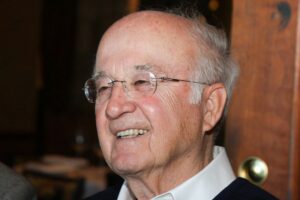
Biography of Wendell Lady, former Speaker of the Kansas House of Represenatives
Interviewed by Edward Flentje
A version of an oral history interview was posted on KansasMemory.org, the website of the Kansas Historical Society prior to the KPHP Board's decision not to publish the interview.
Instead of publishing the interview, the obituary from McGilley State LIne Chapel is posted here.
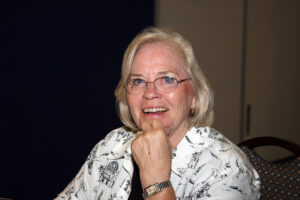
Interview of Janis Lee, October 14, 2019
Interviewed by Joan Wagnon
Former State Senator Janis Lee's 2019 oral history interview covered her 22 years in the Kansas Senate as well as several years on the Kansas Court of Tax Appeals (formerly the Board of Tax Appeals and later returned to that name). The interview covers many topics, including how she campaigned in a rural district that increased in area over those 22 years, driving as much as 45,000 miles in an election year. Lee developed expertise in tax issues that was important to the agriculture community and in funding rural schools. Water supply was an important issue in her district, Show Moreas was adapting federal regulations so they would work in rural communities. She witnessed the shift to a more conservative legislature and more anti-abortion legislation. Funding for schools dominated most sessions. Show Less

Interview of Robert (Bob) Miller, November 9, 2017
Interviewed by H. Edward (Ed) Flentje
Former Speaker of the Kansas House of Representatives, Robert (Bob) Miller recalls his many years of service to the State. He describes his involvement with the Young Republicans at K-State, his first campaign to represent his area of Sumner County, and moving up through the ranks in the House despite not having ambition for any other elected position. Miller reflects on his sometimes arms-length relationships with fellow House members and with lobbyists. From his position as chair of the House Federal and State Affairs Committee he oversaw the development of implementing legislation for liquor-by-the-drink, parimutuel wagering, and Show Morethe State Lottery by building subject-matter expertise within the committee. Miller describes instances when legislators' positions on policy issues did not break along purely partisan nor on purely urban-rural lines. He also witnessed the early development of what eventually became the conservative movement in the Legislature.
A version of this interview is also posted on KansasMemory.org, the website of the Kansas Historical Society. Show Less
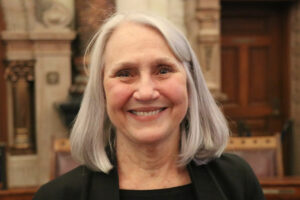
Interview of Nancy Parrish, October 23, 2020
Interviewed by Patty Clark
This 2020 oral history interview of former State Senator Nancy Parrish is packed full of information about people and policy between 1980 and 1992 in the Kansas Senate. She was one of the first, if not the first Democrat women elected to the state senate. Parrish talks about establishing her own identity after filling the unexpired part of her husband's term and winning the seat three more times while fostering a child, adopting a child, and attending law school at Washburn University. Her relationships with Republican senators allowed her to be effective in passing or shaping legislation. Show MoreParrish served on the conference committee to negotiate the 1992 school finance bill. Parrish also discussed her two years as Secretary of Revenue and working with Senator Gus Bogina to pass legislation to provide for purchase of a large-scale computer system for collecting taxes at the Department of Revenue. Parrish offers opinions on the importance of the separation of powers in the constitution, from her perspective as a former legislator, an executive branch administrator and a judge. For Parrish, each of these experiences has been a learning experience. She concludes the interview by expressing concern about the loss of "camaraderie" among legislators. Show Less

Interview of Marge Petty, September 11, 2020
Interviewed by Patty Clark
This oral history interview of former Senator Marge Petty covers her 12 sessions in the State Senate representing a Topeka district (Senate 18). Petty talks about why she registered as a Democrat, challenged a sitting Republican woman Senator in the 1988 election, and won. She discusses specific issues such as the investigation of the KPERS venture capital investments with other Senators, healthcare issues, foster care, and education. The interview also chronicles her career after leaving the legislature in 2000. Petty talks candidly about losing that last election, after which she began working for the Kansas Corporation Show MoreCommission. Later, she decided to move back to Dallas and worked to secure an appointment from President Obama as a regional representative of Health and Human Services. Petty describes the process of going after that appointment. This is a wide-ranging interview that shows the energy and skills Petty brought to the public arena. Show Less

Interview of Jo Ann Pottorff, October 9, 2020
Interviewed by Patty Clark
Former Kansas State Representative Jo Ann Pottorff describes her best legislative work as getting the Parents as Teachers program passed. With her background in education, she saw opportunity for this program to make a difference for children. Pottorff’s policy interests were education, financing the work of the legislature, and funding schools. In order to pursue those interests, she secured an assignment to the House Appropriations Committee early in her tenure. Over the course of her service in the Legislature her interests broadened. Pottorff was assigned to the Joint Committee on State Building Construction, which she chaired for a Show Moretime, and as a member of that Committee was involved in the renovation of the Capitol building. At the national level, Pottorff worked with National Conference of State Legislators (NCSL) and the Women's Legislative Network which allowed her to meet other women in office and to travel internationally, to Korea, Japan, Taiwan, and Germany. Pottorff describes the changes in the culture of the legislature during her years of service (1985-2012). She notes the rise in partisanship and inter-party divisions evidenced by the fact that she was often targeted in a Republican primary election when she sought renomination. Show Less

Interview of William (Bill) Reardon, August 2, 2019
Interviewed by Jim McLean
Bill Reardon is a story-teller, famous in the Democrat caucus for his jokes, stories and anecdotes, told with great enthusiasm. This entertaining interview is also filled with some of those stories. Reardon talks about how he was inspired by seeing John F. Kennedy in Kansas City and also by his brother and father, both political figures in Wyandotte County. There is an entertaining description of a hearing he chaired in the Federal and State Affairs committee on the Equal Rights Amendment in 1977. Reardon divides his legislative service into two periods—the bipartisan problem-solving work of the first 15 years, and Show Morea more ideologically driven, partisan era in the last fifteen years. His descriptions of developing and passing the 1992 school finance bill are consistent with other interviews of legislators serving at that time. Reardon tells stories about how leadership worked and discloses his observations about the Brownback years when he was serving as a lobbyist for the school district. He did end the interview with his story about a land turtle which was not transcribed because of its length, but if you see Reardon, ask him about the turtle story. Show Less
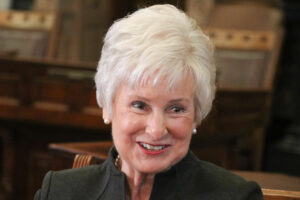
Interview of Alicia Salisbury, October 23, 2020
Interviewed by Patty Clark
Former Senator Alicia Salisbury grew up in a political family--both father and grandfather served in the legislature--so her sixteen years of service as a Kansas Senator continued the family tradition. She also was a serious legislator who believed in community service as witnessed by the numerous boards and committees on which she served, both volunteer and elected. Salisbury's driving interests were improving the economy of Kansas and bringing growth in wealth to her community and state. Salisbury's 2020 oral history interview chronicles her work ethic. With her children no longer at home, she had the Show Moretime and the interest to dive into a wide assortment of issues, from workforce development, to interstate banking, to telecommunication reform, to a blue ribbon panel on workers compensation. Salisbury worked long hours and focused on constituent services. She boldly asked for the committees that interested her and championed changes where necessary. Salisbury succeeded in changing the Labor and Industry Committee into the Commerce Committee to handle everything from economic development strategies to workers compensation. She tackled tough issues with a sense of humor and the skills of collaboration learned as a volunteer leader. This interview describes her determination, her commitment, and her legacy to the state of Kansas as Vice President of the Senate. Show Less

Triple Date – Conversation with former Senators Alicia Salisbury and Nancy Parrish, October 23, 2020
Interviewed by Joan Wagnon
In this short 2020 Statehouse Conversation two former Kansas State Senators, Nancy Parrish and Alicia Salisbury recall their first year serving in the Kansas Senate. In 1984 Shawnee County elected three women Senators: Nancy Parrish, a Democrat; Jeannie Hoferer, a Republican, and Alicia Salisbury, a Republican. Martin Hawver, a reporter for the Topeka Capitol Journal at that time, referred to them as a "Triple Date." Two of the three former senators discuss briefly what it was like in the Senate in 1985 when they took their seats and how they were treated by their male colleagues. Salisbury and Parrish saw Show Morewomen's issues as "people issues." Salisbury relates being removed from a conference committee on an education bill because she "did what's best for the schools she represented." Show Less
